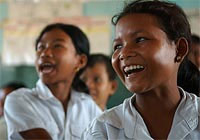


Today the InterAcademy Partnership (IAP) joins the celebrations for the International Day of Education, a day proclaimed by the United Nations General Assembly to honour education and its centrality to human well-being and sustainable development.
The 2020 celebration positions education and the learning it enables as humanity’s greatest renewable resource and reaffirms the role of education as a fundamental right, a public good and an enabler of the 2030 Agenda for Sustainable Development. It also frames ‘inclusive and equitable quality education and lifelong learning for all’ as a goal in and of itself, as well as a necessary means to accelerate progress to meet the targets of all 17 Sustainable Development Goals.
One of IAP’s major priorities is to help build a scientifically literate global society. The IAP Science Education Programme (SEP) was launched in 2003, and IAP seeks to reform and develop science education on a global scale, especially in primary and secondary schools, with a pedagogy based on inquiry based science education (IBSE) - or "learning by doing".
IBSE provides opportunities for students to see how well their ideas work in authentic situations rather than in abstract discussions. Students build knowledge through testing ideas, discussing their understanding with teachers and their peers, and through interacting with scientific phenomena.
Practical activity, involving a direct contact with reality, is an essential ingredient of IBSE, as the hands-on approach, combined with a ‘minds-on’ engagement, helps to develop a better understanding of scientific concepts and, even more important, of the nature of scientific reasoning. IAP supports a global action towards IBSE development, in order to foster exchanges and communication between a number of national or regional pilot projects. IAP supports and encourages these projects with specific support and especially through the involvement of science academies. This support has been continuously increasing since the year 2000, after the development of IAP capacity building activities with the Academies.
In order to accompany this growth, the IAP Science Education Programme (SEP), led by a Global Council of experts chaired by Wafa Skalli (Morocco), defines and implements to annual activities of the SEP on global and regional scales.
"While science museums and science centres play an essential role in promoting science literacy and a ‘culture of science’, the emphasis that governments place on science museums and science centers around the world varies quite dramatically, and this has resulted in quite an unbalanced distribution of them," says Prof. Wafa Skalli, Chair of the IAP SEP Global Council.
Prof. Skalli stresses the fact that in last SEP-IAP meeting, Susan Stocklmayer, Founder Director of the UNESCO Centre for Public Awareness of Science, highlighted the need for more science centres or science museums in Africa, where of the 41 such resources on the continent, 33 are located in South Africa.
The council priority, continues Prof. Skalli, has been set on promoting the development of ‘Centers for science and technology’ in Africa. Such centers may bring huge benefits at a reasonable cost with the aim to :
• Promote and support practical training on IBSE, by hosting both pupils and teachers in a dedicated space for practical training sessions,
• Promote the implication of university students and teachers from various research labs to these IBSE approaches, with a fablab and technical center for « do it yourself » pedagogic material,
• Offer the general public (students, parents, local association, institutional partners, …) a place for initiation to scientific culture and for sensibilisation to science positive impact via exhibitions and fora.
"A working group with various memers of academies of science was constituted with the objective of impulsing the creation, within the three coming years, of five ‘Centers for science and technology’ in at least five african countries," Prof. Skalli says, emphasising that next IAP SEP meeting in Washingtrom DC will be the opportunity to share about the advancement of such project.
If you want to know more about more about IAP SEP check its page on our website or read page 16 of the 2018 IAP Annual Report.